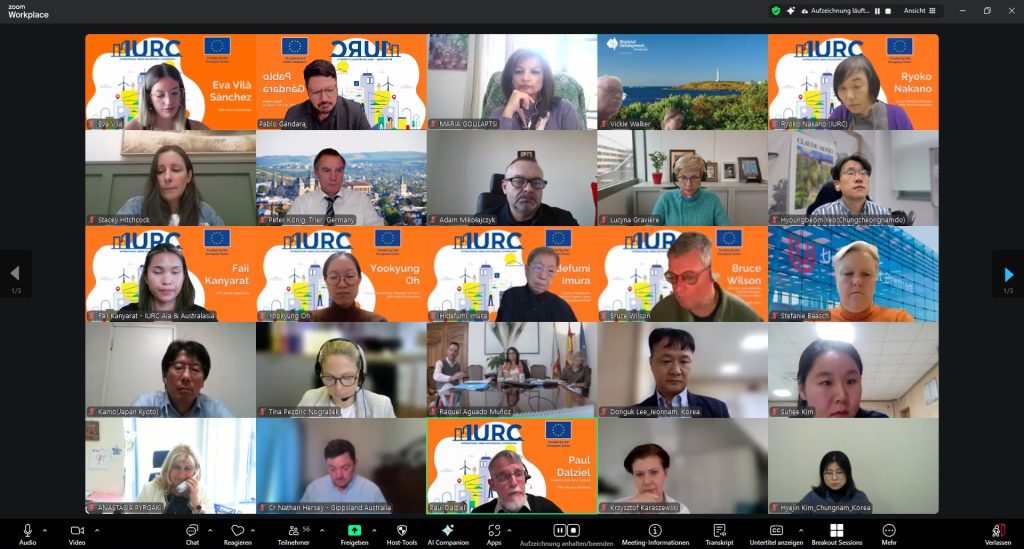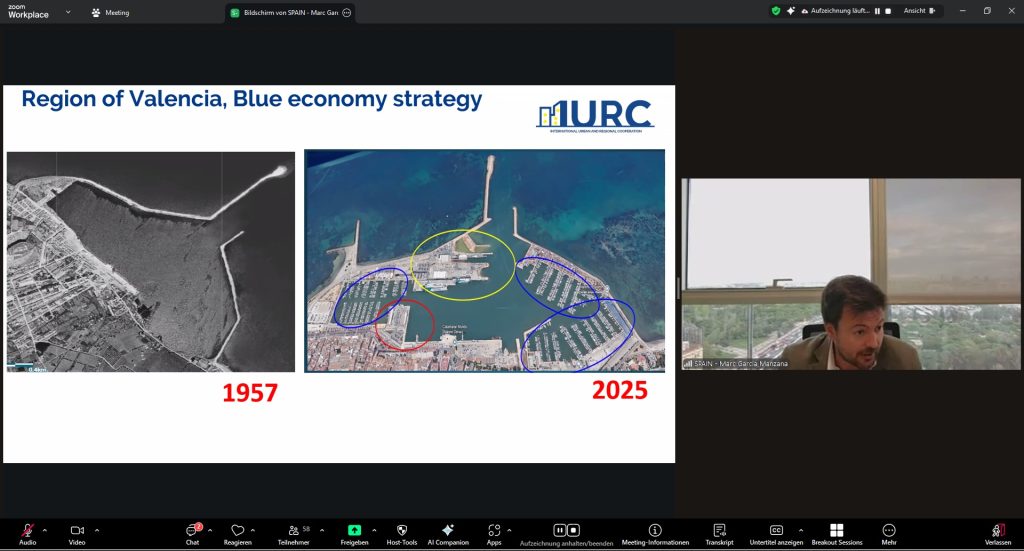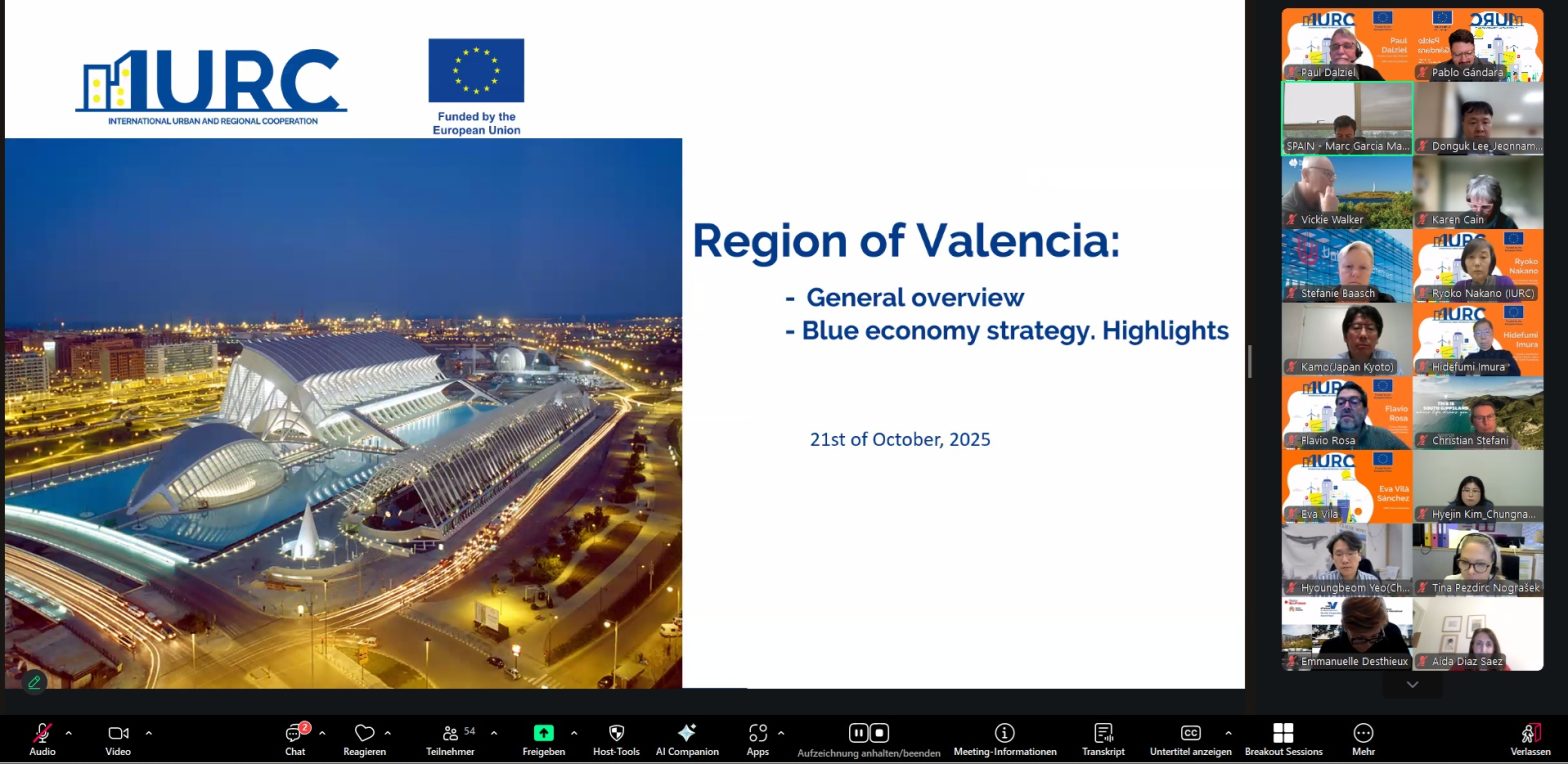The fifth session of Region-to-Regional Cooperation brought together 50+ participants from various regions including Europe, Australia, New Zealand, Korea, and Japan to discuss cooperation in industrial transition, agribusiness, blue economy, and clean energy. The meeting featured a presentation from the Region of Valencia on their Blue Economy Strategy and included breakout sessions for participants to discuss specific thematic areas. The session concluded with plans for the upcoming IURC Networking Event in Barcelona focused on regional innovation cooperation, where participants will engage in discussions and develop partnerships across various sectors. The meeting was moderated by Pablo Gàndara, IURC Team Leader and breakout room discussions were facilitated by Pablo Gándara, Bruce Wilson, Paul Dalziel and Eva Vila. They aimed to define practical steps toward regional cooperation action plans, with draft versions expected by March 2026. Participants were also briefed on the upcoming Smart City Expo World Congress (SCEWC) in Barcelona (4–6 November 2025), where regional clusters will continue their collaboration through thematic networking, breakout sessions, and pilot project discussions.

Valencian Blue Economy Strategy Overview
After a brief overview, Raquel Aguado Munoz, Director General for international relations, introduced Marc García, who was scheduled to present on behalf of the Region of Valencia. Marc presented the Blue Economy Strategy for the Valencian region, highlighting its diverse economy, rich coastal resources, and strong tourism sector. He outlined plans to modernize ports, promote sustainable tourism, and integrate technology into port management.

The conversation ended with instructions for participants to join their respective breakout sessions.
Breakout Session Room Assignments
Participants were guided to join breakout sessions for Industrial Modelization, Agree Food, and Clean Energy/Blue Economy. Faii helped participants access the correct rooms by sending invitations and resolving technical issues. The session aimed to facilitate discussions in separate breakout rooms, with participants assigned based on their preferences or previous session participation
Industrial modernisation
The discussion revolves around industrial modernization, AI-driven innovation, and cross-regional collaboration within the EU and partner regions like Japan and Australia. Participants explore how technology, academia, and industry can jointly advance modernization and sustainability.
The conversation highlighted key themes from on industrial modernisation, focusing first on artificial intelligence (AI) and its role in regional economic development. Aida Diez explained the different networks in Catalonia that support economic development, with artificial intelligence (AI) highlighted as one element of the regional innovation ecosystem, noting how AI is a key network among several that drive economic and industrial development in Catalonia. Pablo mentioned an upcoming site visit to Catalonia’s AI network in Barcelona, where such networks support innovation and growth.
Moving from digital transformation to energy, Peter König from Trier underlined the cross-cutting challenge of energy transition, citing examples from Germany, where small and mid-sized industries face distance from hydrogen infrastructure, making biomethane an important alternative. Charles Jenkinson from RDA South West in Australia referred to industrial change to other sectors, such as agriculture and winemaking, emphasizing the importance of technology and value chain transformation. Lucina Gravière, from Auvergne–Rhône-Alpes in France, spoke about her region’s digital transformation of traditional industries and its emphasis on human-centered modernization. Adam Mikołajczyk from Pomorskie, Poland, shared how his region was transitioning from traditional industries toward clean energy, particularly offshore wind power.
Pablo noted links with the Blue Economy cluster and stressed that these interconnected clusters aim to foster collaboration across regions and industries, both through upcoming Barcelona activities and future study visits planned for 2026. As the session closed, Pablo reflected on how these different regions — from Europe to Australia and Japan — were confronting similar challenges of energy transition, digital innovation, and climate resilience. The conversation revealed a shared understanding: that academia, industry, and public institutions must work together across borders to shape a modern, sustainable industrial future.
Agrifood
10 regions joined the Agrifood break out session and five were able to respond to the three questions: Mazovia, Kyoto, Manawatu, Val d’Oise and Gippsland. Common themes included: brand development and market intelligence, including use of new technologies; the application of technologies to improve agricultural productivity; logistics; and adaptation to climate change.
The discussion began with Piotr Dlevsky from Poland (Mazovia region), who presented a detailed overview of his region’s economic and technological landscape. Mazovia, he explained, is a dynamic center for agriculture, food technology, and startups, with strong ties to scientific research and innovation. Roughly 30% of Poland’s IMD (Innovation, Modernization, and Development) potential resides there, particularly in fruit, vegetable, and diet-related production. The region boasts a vibrant agritech startup ecosystem, and two local startups recently reached the finals of a national innovation competition — one specializing in logistics and the other in climate adaptation. Piotr also highlighted increasing investment in renewable energy, notably biogas plants and agricultural photovoltaics, illustrating how Mazovia is aligning agricultural modernization with green transition goals.
Building on this theme, participants discussed how academia, research institutions, and local industries can collaborate more effectively to accelerate these transformations. Several speakers echoed the importance of knowledge transfer between universities and businesses, emphasizing that modernization must be both technologically advanced and human-centered.
The dialogue touched on energy resilience, a recurring challenge for many regions. Participants from across Europe noted that rural industries often lack access to hydrogen infrastructure, making alternatives like biomethane and solar integration essential for local sustainability. This mirrored discussions from previous sessions about cross-cluster collaboration — linking industrial modernization with agriculture, AI, and energy innovation.
Clean Energy and the Blue Economy
The facilitator explained that the two themes had come together because some regions are exploring offshore wind farm technologies, creating a strong overlap. There were 15 regional representatives and 3 IURC participants in the room. Each representative introduced themselves. Some regions have had long experience in transitions to clean energy or developing the blue economy, including longstanding collaborations with universities to develop multi-sector strategies, impact and readiness studies, technological demonstrations and identification of local strengths for clean energy technologies. Immediate challenges include: (1) working in collaboration with central government; (2) crafting value statements for potential private and public sector investors; (3) ensuring balanced, inclusive and equitable developments; and (4) achieving strong stakeholder and public engagement. All the speakers expressed their commitment to collaboration and knowledge exchange with partners in the IURC programme.
The conversation ended with a reminder of the next region-to-region meeting scheduled for 28 October 2055.
